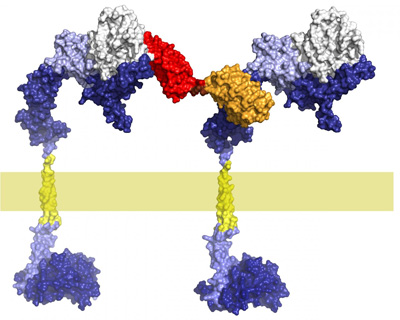Bending HER2 receptors to kill off invasive breast cancer
Posted: 3 June 2016 | Victoria White, Digital Content Producer | No comments yet
Scientists have now discovered an effective solution to switch off all signals emanating from HER2 in breast cancer cells at the same time…

The new active ingredient consists of DARPins (red and orange) bend the HER2 receptors (blue) so no more growth signal is transmitted into the cell interior (below the cell membrane in yellow). CREDIT: UZH
In some very invasive forms of breast cancer, the cells have too much of the receptor HER2 on their surface. This leads to uncontrolled growth of the cells. Various antibodies such as trastuzumab and pertuzumab, which recognise the HER2 receptor, have been used in breast cancer therapy for many years now. However, these antibodies do not kill off the cancer cells. Instead, they render them dormant, and the cancer cells can become active again at any time.
A team led by Andreas Plückthun, Director of the Department of Biochemistry at the University of Zurich, has now found out why these antibodies merely slow tumour growth rather than killing off the cancer cells. The receptor HER2 uses several signalling pathways at the same time to inform the cell that it should grow and divide. But the antibodies available thus far only block one of those signalling pathways, while the others remain active. The most important of these open paths leads through the central hub called RAS. “It is this protein that is responsible for reactivating the growth signal emitted by the HER2 receptor. The antibodies lose effect and the cancer cells continue to proliferate,” explains Andreas Plückthun.
Switching off all signals
The scientists have now discovered an effective solution to switch off all signals emanating from HER2 in the cancer cells at the same time. They have designed a protein compound that binds itself simultaneously to two HER2 receptors in a targeted manner and changes their spatial structure. This “receptor bending” prevents any growth signals from being transmitted into the cell interior, and the cancer cells die off. Another advantage is the very selective effect of the substance, which ensures that the cancer cells are killed off efficiently but healthy body cells remain unharmed. For example, the innovative protein substance has caused the tumours in mice to regress without endangering the health of the animals.
The active ingredient comprises several DARPins (designed ankyrin repeat proteins). This new class of protein compounds, created in Plückthun’s biochemistry lab, have a large number of favourable binding properties. A very similar substance is now being developed by Molecular Partners, a spin-off company of the University of Zurich. The aim is to test the first drug that functions according to this mechanism in patients as soon as possible in the course of clinical trials.
Related conditions
Breast cancer
Related organisations
Zurich University


